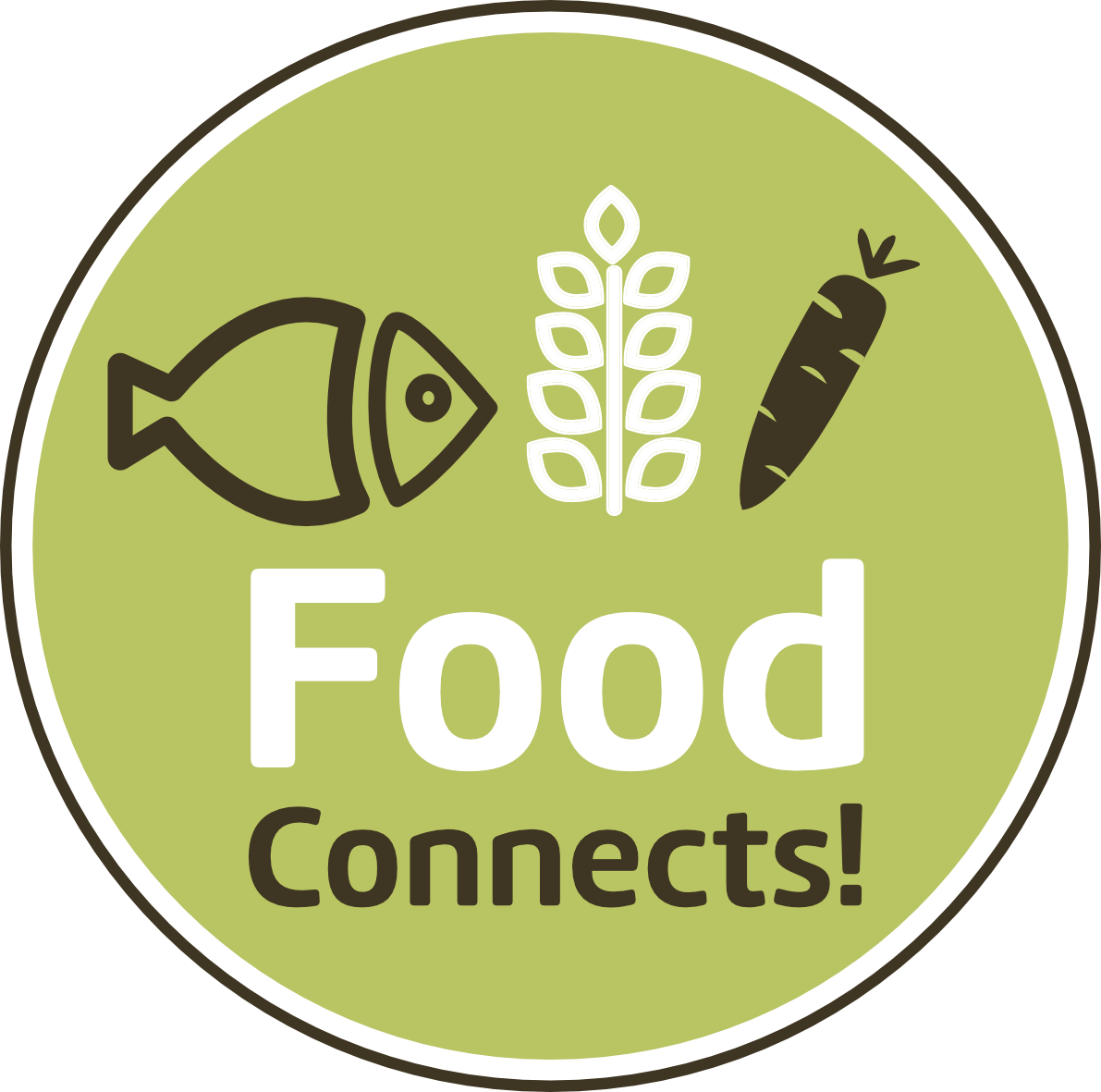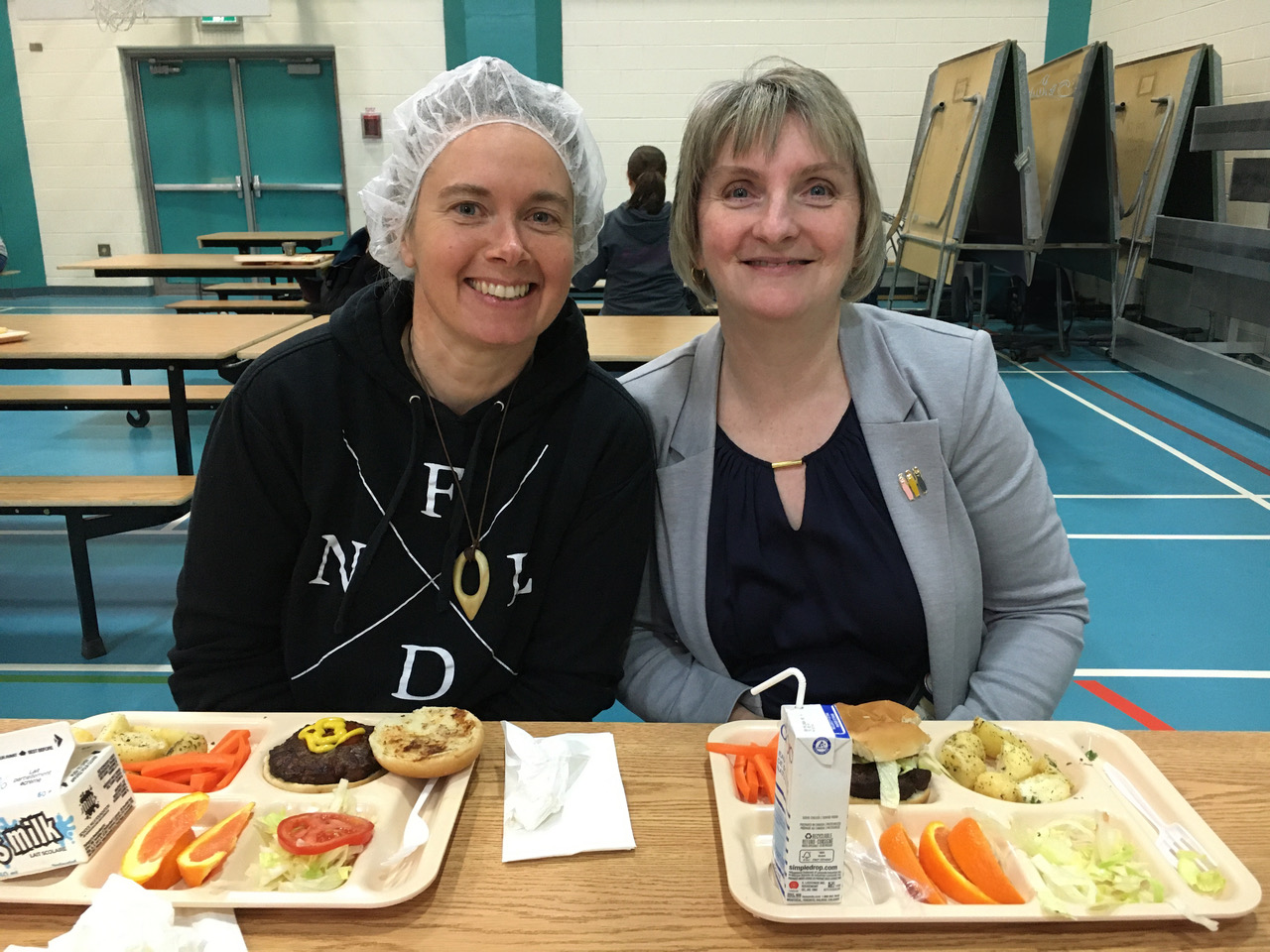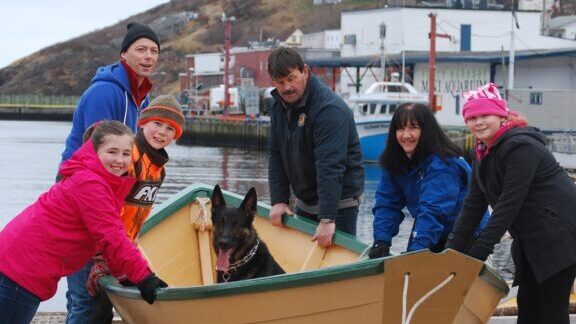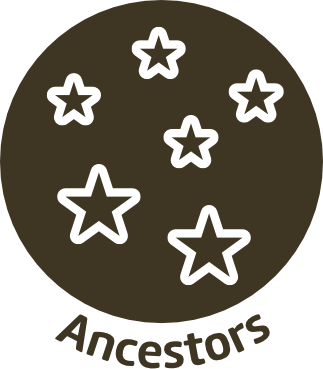

Champion: Emily Doyle
Location: St. John’s, Newfoundland and Labrador
Nominator: Sarah Ferber, Program Manager, Food First NL
Favourite way “food connects”: Ancestors
Link to F2CC: Food systems researcher and school volunteer
Emily Doyle (L) pictured with Melissa Caravan, Regional Nutritionist, Eastern Health during a moose burger lunch served by the School Lunch Association at Clarenville Middle School. Photo Credit: Emily Doyle
They extend into the 1800s and connect her to ancestors from Fortune Harbour (the birthplace of her 105-year-old grandmother), King’s Cove, Placentia Bay and St. John’s. They nourish her commitment to improve food systems by understanding how food systems have changed through time – from the impact of European settlement and colonization to the advent of technology and commercialization.
“I am interested in my past to help navigate a better future on this island I call home,” says Emily, a mother of three, whose research focuses on school food and food systems transformation (the way food is understood, sourced, produced and consumed).
Through her engagement with schools over the past 10 years where she says she connects with the “natural energy children have around food,” her work aims to strengthen connections between food from the land and sea and what is consumed in school. “I am happiest when there is food in front of me, whether it be in sea or ground, on a cutting board, on a plate, or even in the compost bin.”
As part of her time volunteering with her children’s school, Vanier Elementary, supporting the Land-to-School Project at Farm to Cafeteria Canada (F2CC) grant recipient, Bayview Academy and working as an academic researcher at Memorial University of Newfoundland (MUN), Emily Doyle is increasing awareness of the source, sustainability and quality of school food, including the need to uncover ways to serve more food from the ocean in Newfoundland and Labrador schools.
Emily believes it has become ingrained in society to expect less of school food, and that this needs to change. For her part, Emily believes schools in her Atlantic province should look to the ocean when considering making healthy food available. “We need to prioritize how fish and the ocean are important sources of food for people in this part of the world.” At F2CC, we call this “Sea to School.”

Curious to learn more about sea to school? Check out these links:
As a F2CC champion, Emily works to help students “understand our place in the systems that produce not only our food, but us as well.” That includes how to live sustainably as a human race, and understand how to survive in the environments we live in.
“I have learned a lot from Farm to Cafeteria Canada over the years,” Emily explains. “I seek out this organization to learn best practices in school food in the country, and I am grateful to be involved in the conversation.”
Emily’s research at MUN’s Environmental Policy Institute, under the supervision of Dr. Kelly Vodden, examines the connectivity between food systems, health, the environment, social well-being, and the economy. “My goal over the past year has been to develop relationships with different communities working towards food systems change,” she explains. Emily is currently working with the Three Rivers Mi’kmaq Band on the west coast of the island as they seek to respond to their community food needs.
She is also part of a major national research initiative, based at the University of Saskatchewan, to study different models of school food across the country.
In a perfect world, Emily believes food becomes a gathering point that bridges divisions in society, helps people reflect on their past, and helps build a better future for everyone. School food is part of the infrastructure to improve health, education, the economy, and sustainable social systems.
 While food connects us in many ways, we asked Emily to pick one “food connects” theme that really resonates with her. She chose ancestors.
While food connects us in many ways, we asked Emily to pick one “food connects” theme that really resonates with her. She chose ancestors.
“Ancestry helps us understand history, the evolution of food systems, and the harms done to the original peoples. Beginning with this understanding is an important place to build a better future.”
Champions like Emily are helping F2CC live its mission of transforming how food is experienced, learned, and celebrated by helping students connect to a deeper understanding of food production and consumption, and the importance of sustainability. Emily’s post-doctoral research sets out to inform improvements to food systems building on an understanding of different models of school food and her in-school leadership at Vanier Elementary and Bayview Academy are having a direct impact on students’ lives and by inspiring others to become involved.
Emily Doyle shows a commitment to food systems change. But she can’t do it alone. Help us support more individuals like Emily and school communities like Bayview Academy to create lifelong connections between students and their food, and the systems that produce it.